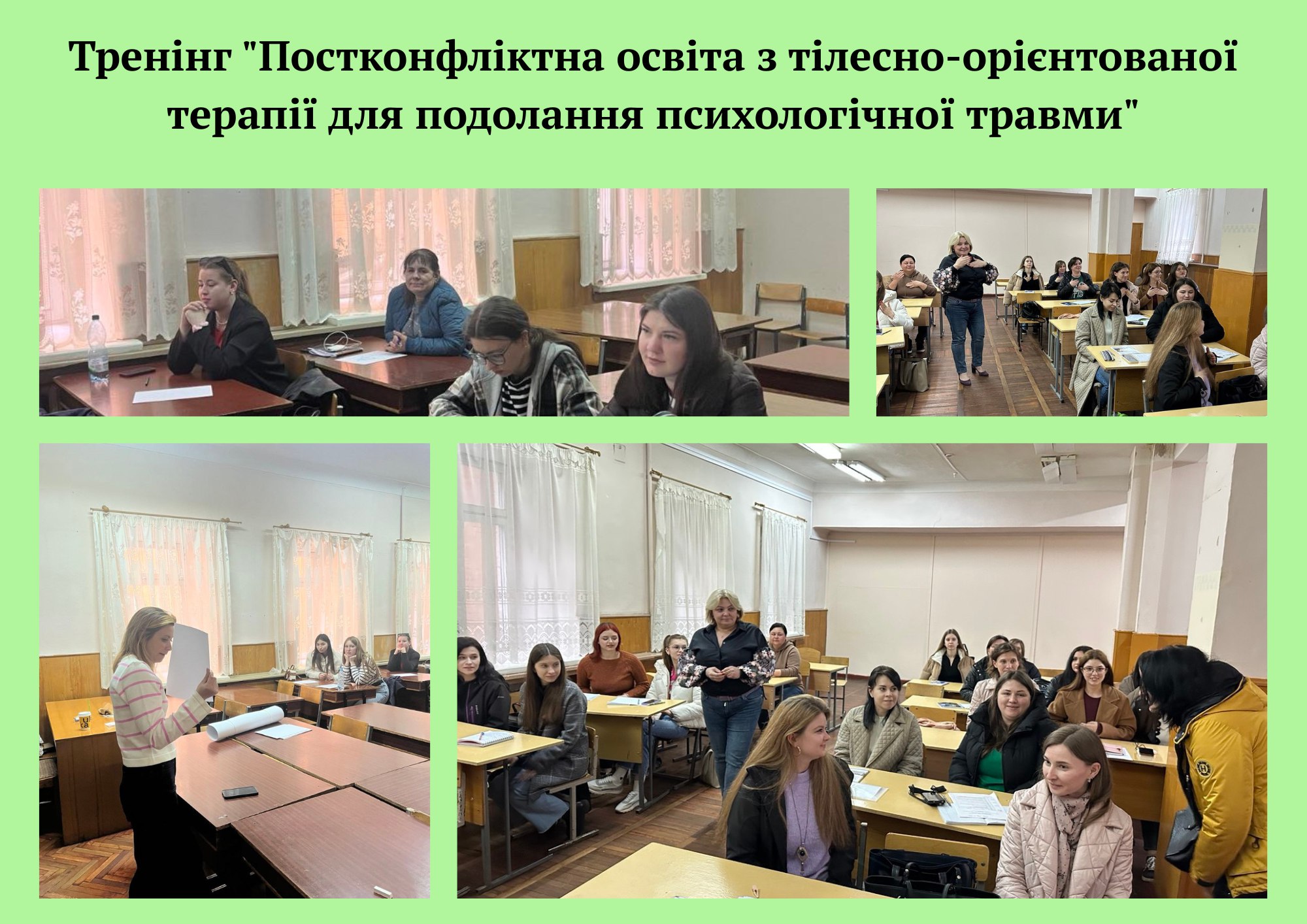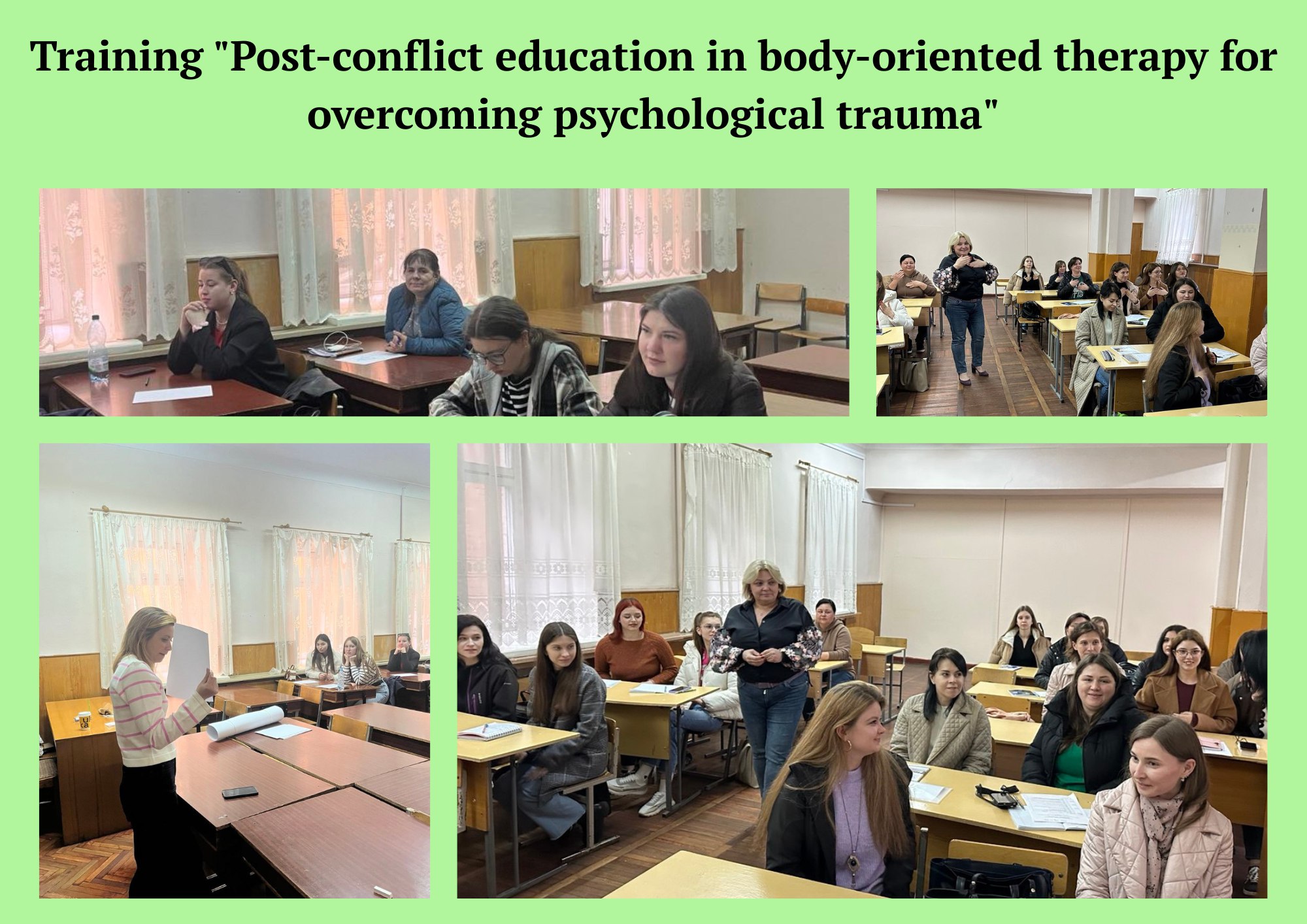Розпочато тренінги "Постконфліктна освіта з тілесно-орієнтованої терапії для подолання психологічної травми": підтримка дітей через роботу з тілом

На кафедрі початкової освіти та інноваційної педагогіки Педагогічного факультету УДУ імені Михайла Драгоманова стартувала серія тренінгів у межах міжнародного проєкту «EU4YOUTH – Post-conflict Education and Trauma-Informed Pedagogy Programme». Тренінги проходять за програмою "Постконфліктна освіта з тілесно-орієнтованої терапії для подолання психологічної травми", у партнерстві з Університетом Вітаутаса Магнуса (Литва). Проводять заняття професорка, докторка педагогічних наук Олена Матвієнко та старша викладачка Дар’я Губарєва.
Мета тренінгів — надати майбутнім і чинним педагогам інструменти для роботи з дітьми, які зазнали психологічної травми, через тілесно-орієнтований підхід, що допомагає відновити контакт з тілом, розпізнати емоції та стабілізувати емоційний стан.
Уже проведено два заняття. Перше з них було присвячене основам тілесно-орієнтованої терапії. Учасники ознайомилися з теоретичними засадами методу, зокрема з поняттями локалізації емоцій у тілі та соматичних реакцій на стрес. Важливою частиною були практичні вправи — знайомство через «Ім’я і жест», створення власної «Мапи тіла» для виявлення зон відчуттів, а також робота із дзеркалом, що дозволила побачити, як емоції проявляються у зовнішньому вигляді. Завершилось заняття груповим обговоренням, під час якого учасники ділилися власними відкриттями про взаємозв’язок тіла і внутрішнього стану.
Друге заняття було зосереджене на темі психологічної травми. Його основною метою було допомогти педагогам розпізнавати тілесні маркери посттравматичного стресового розладу (ПТСР) та краще розуміти механізми «заморожених» реакцій і соматизації. У практичній частині учасники працювали в парах, створюючи «тілесну історію травми», досліджували «сигнали небезпеки» через виявлення точок напруги в тілі, а також виконували рухову вправу «Бий – Біжи – Завмри», яка імітує базові реакції на загрозу. Інтерактивна частина включала розбір типових кейсів із досвіду педагогічної практики.
За результатами двох занять учасники сформували первинні навички тілесної усвідомленості, навчилися звертати увагу на невербальні сигнали стресу у дітей та отримали дієві інструменти для підтримки їх емоційного стану в безпечний і делікатний спосіб.


TRAININGS “POST-CONFLICT EDUCATION IN BODY-ORIENTED THERAPY TO OVERCOME PSYCHOLOGICAL TRAUMA” HAVE BEEN LAUNCHED: SUPPORTING CHILDREN THROUGH BODYWORK
The Department of Primary Education and Innovative Pedagogy of the Faculty of Education of the Drahomanov Ukrainian State University has launched a series of trainings as part of the international project EU4YOUTH – Post-conflict Education and Trauma-Informed Pedagogy Program. The trainings are held under the program “Post-conflict Education in Body-Oriented Therapy for Overcoming Psychological Trauma” in partnership with Vytautas Magnus University (Lithuania). The classes are taught by Olena Matvienko, Professor, Doctor of Pedagogical Sciences, and Daria Hubarieva, Senior Lecturer.
The goal of the trainings is to provide future and current teachers with tools to work with children who have experienced psychological trauma through a body-oriented approach that helps restore contact with the body, recognize emotions, and stabilize the emotional state.
Two classes have already been held. The first one was devoted to the basics of body-oriented therapy. The participants learned about the theoretical foundations of the method, including the concepts of emotion localization in the body and somatic reactions to stress. Practical exercises were an important part of the training: getting to know each other through “Name and Gesture”, creating their own “Body Map” to identify areas of sensations, and working with a mirror to see how emotions manifest themselves in appearance. The session ended with a group discussion, during which participants shared their discoveries about the relationship between the body and the inner state.
The second session focused on the topic of psychological trauma. Its main goal was to help teachers recognize the bodily markers of post-traumatic stress disorder (PTSD) and to better understand the mechanisms of frozen reactions and somatization. In the practical part, the participants worked in pairs to create a “body history of trauma,” investigated “danger signals” by identifying tension points in the body, and performed the “Hit-Run-Freeze” exercise, which simulates basic reactions to a threat. The interactive part included an analysis of typical cases from the experience of pedagogical practice.
As a result of the two sessions, the participants developed primary skills of body awareness, learned to pay attention to non-verbal stress signals in children, and received effective tools to support their emotional state in a safe and sensitive way.

